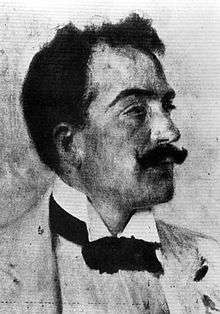Siberia (opera)
| Umberto Giordano |
|---|
 |
|
Operas
|
Siberia is an opera in three acts by Umberto Giordano from a libretto by Luigi Illica. There is no direct source for the plot of Siberia and it is quite possible that this is an original work by Illica. It was suggested at the New York premiere that it was based on Leo Tolstoy's novel Resurrection or one of the novels within it.
Performance history
The première took place on 19 December 1903 at La Scala in Milan and was revised in 1927. The première was not successful, despite having an illustrious first-night cast (Puccini's Madama Butterfly had been cancelled and Siberia took the same vocal distribution so the singers were re-engaged for Giordano's opera), it received more praise in its opening in Genoa and then in Paris in May 1905. It was premièred in the USA, in New Orleans at the French Opera House on 31 January 1906. The composer Gabriel Fauré thought highly of the first act when he heard it in Paris in 1905.
Roles
| Role | Voice type | Premiere Cast, 19 December 1903 (Conductor: Cleofonte Campanini ) |
|---|---|---|
| Stephana | soprano | Rosina Storchio |
| Prince Alexis | tenor | Oreste Gennari |
| Gleby | baritone | Giuseppe De Luca |
| Vassili | tenor | Giovanni Zenatello |
| Nikona, Stephana's godmother | mezzo-soprano | Palmira Maggi |
| Ivan | tenor | Emilio Venturini |
| Ipranivick | tenor | Federico Ferraresi |
| Walitzin | baritone | Vittorio Pozzi-Camola |
| Walinoff | baritone | Pozzi-Camola |
| Miskinski | baritone | Antonio Pini-Corsi |
| Commissario | bass | Antonio Volponi |
Synopsis
- Place: Russia
- Time: First half of the 19th century.
Act 1: "The Woman"
Saint Petersburg, August, during the Festival of Saint Alexander
Stephana is the mistress of Prince Alexis, living in an elegant Palace, who was once seduced by Gleby, a scoundrel, who sold her to the Prince and has been living off a pension granted to him by the Prince. Stephana loves Vassili, a Lieutenant who corresponds with her but assumes she is a simple working girl, because they always meet in disguise outside her house. When summoned to war he goes to meet Stephana and learns the truth about her, but he is still smitten with her. The Prince enters and demands an explanation which develops into a duel during which Vassili kills the Prince with his sword; he is detained and sent to the police.
Act 2: "The Lover"
The frontier between Russia and Siberia in winter
Several prisoners are making their way through the snow on foot to the mines where they are forced to work. Amongst them is Vassili worn almost out, he is despairing, a group of women and children are waiting along the road to bid farewell to the prisoners. Stephana arrives in a sleigh, she has left all to join her beloved in whatever fate awaits him, she does not listen to his pleas to return, when ordered to, they both march into the vastness of Siberia.
Act 3: "The Heroine"
A hut of convicts in the mines of Trans-Baikal on the eve of Russian Easter
Due to the upcoming festivities, the prisoners are allowed to organize a feast. Stephana, excited by this, devises a scheme with an old convict to escape with Vassili, but Gleby has arrived to the prison camp after finally being arrested in one of his many crimes. He recognizes Stephana and insults her in front of everybody, including Vassili, who tries to defend her but is stopped by the other inmates. The church bell rings and prayers start. During the night Vassili and Stephana execute their plan to escape, but Gleby gives the alarm, the troops pursue the prisoners and a shot is heard, they bring Vassili back and carry Stephana, who was wounded, she bids farewell to Vassili and dies.
Recordings
Source: Recordings of Siberia on operadis-opera-discography.org.uk
The original cast members (Zenatello, Storchio, De Luca and Pini-Corsi) made a series of recordings of scenes and arias from the opera in 1903/1904 in Milan for the Gramophone (and Typewriter) Company.
References
- Sources
- Amadeus Almanac, accessed 1 September 2008
- Warrack, John and West, Ewan (1992), The Oxford Dictionary of Opera, 782 pages, ISBN 0-19-869164-5
- "GIORDANO'S 'SIBERIA' FIRST TIME HERE; Another New Opera Produced by Mr. Hammerstein at the Manhattan. MR. BASSI INDISPOSED His Place Taken by Mr. Zenatello at Short Notice -- Mr. Sammarco and Mme. Agostinelli in Other Parts", The New York Times, 6 February 1908 Retrieved 25 November 2009